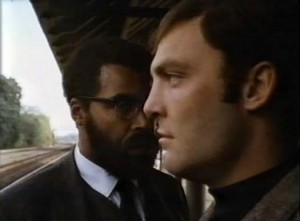STUDIO: Warner | DIRECTOR: Aram Avakian | CAST: Stacy Keach, James Earl Jones, Dorothy Tristan, Harris Yulin, Grayson Hall, Ray Brock
DVD RELEASE DATE: 9/18/2012 | PRICE: DVD $19.97
BONUSES: featurette
SPECS: R | 110 min. | Comedy drama | widescreen | Dolby Digital 5.1
RATINGS (out of 5 dishes): Movie
| Audio
| Video
| Overall
End of the Road is a pitch-black comedy that offers a powerful look at the American zeitgeist at the close of the Sixties. Based on a 1958 novel by John Barth, the cult film has been “MIA” since a VHS release from Key Video back in the late 1990s.
Director Aram Avakian, best known for his superb editing of films like Mickey One and You’re a Big Boy Now, worked closely with his scripters, Dennis McGuire and the legendary Terry Southern (Dr. Strangelove, Easy Rider), to make the film a warped snapshot of its era. Thus, our catatonic antihero (Stacy Keach, The Long Riders) is inundated with the sights and sounds of the times as he is “reprogrammed” by a mysterious and charismatic doctor (James Earl Jones, Cry, The Beloved Country) who runs a very unconventional mental hospital.
Once the programming is done, Keach’s character goes to work as an English prof at a small New England college, where he has a tragic affair with a colleague’s wife (Dorothy Tristan, who was then married to Avakian). The film thus abruptly transitions from a delirious frenzy to a more somber tone, as it explores propriety and everyday fascism — embodied by the cuckolded husband character, played by Harris Yulin (Maidstone) — in a sheltered academic setting.
The shift in tone properly captures the period in which the film was made, but the small cast of theater-trained performers (ably aided by a group of sitcom-familiar faces) had to bring to life the film’s rather allegorical characters. Both Keach and Jones are incredibly good, while Tristan and Yulin do much with their simply sketched characters.
The film is supplemented by a 33-minute oral history of the film, directed by a big End of the Road and Terry Southern fan, Steven Soderbergh (Haywire). Every cast and crew member gets their say, while the departed (Avakian and Southern) are spoken for by their children.
The principals all remember having a great time making the film, and it is duly noted that several members of the crew, including cinematographer Gordon Willis, went on to work on The Godfather, since Francis Coppola asked Avakian to recommend technicians.
The documentary leaves out any greater context — for instance, Avakian and Southern’s prior works are never mentioned, in order to explain how they got this odd little project off the ground. Thankfully Soderbergh doesn’t candy-coat his history: in addition to many amusing anecdotes, he leaves in reflections on Avakian’s perfectionism and temper, and Southern’s wild lifestyle (fueled in equal parts by genius and chemical stimulants).
Also interesting are the principals’ accounts of how badly the film did at the box office, and the dissenting opinions of a few concerning its effectiveness as a narrative — Jones, for instance, notes that it never adequately captures the catatonia undergone by its protagonist.
End of the Road is a challenging viewing experience, with a conclusion that is extremely depressing. The unbridled ambition of Avakian, McGuire and Southern resulted in an incredibly memorable and important work — like many films made in the wake of Easy Rider, the film is wildly uneven but also an extremely personal and troubling work.
|
Buy or Rent End of the Road
|
|||
|---|---|---|---|
DVD |
 DVD DVD |
 DVD DVD |
|

Leave a Reply